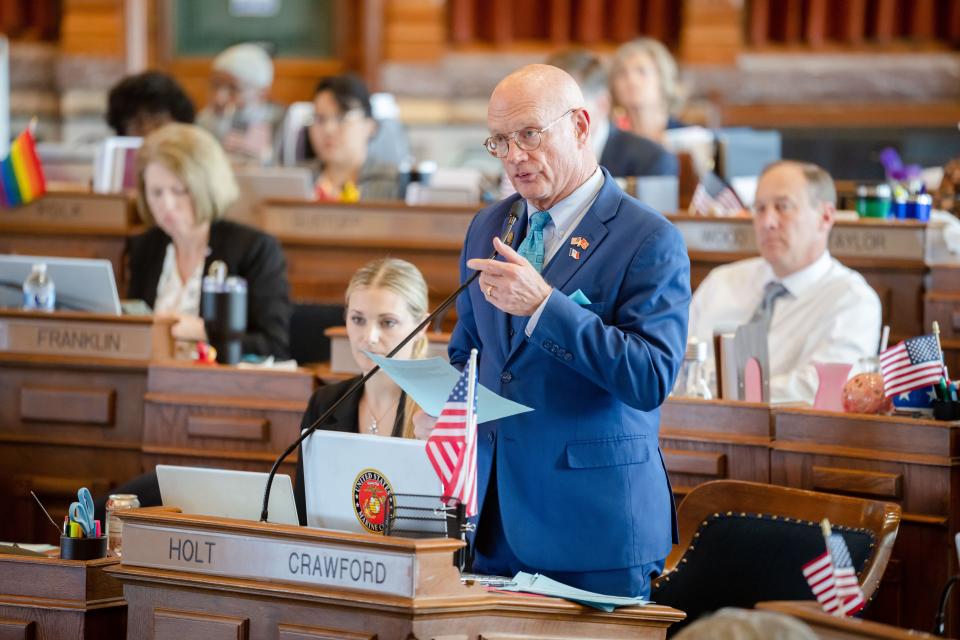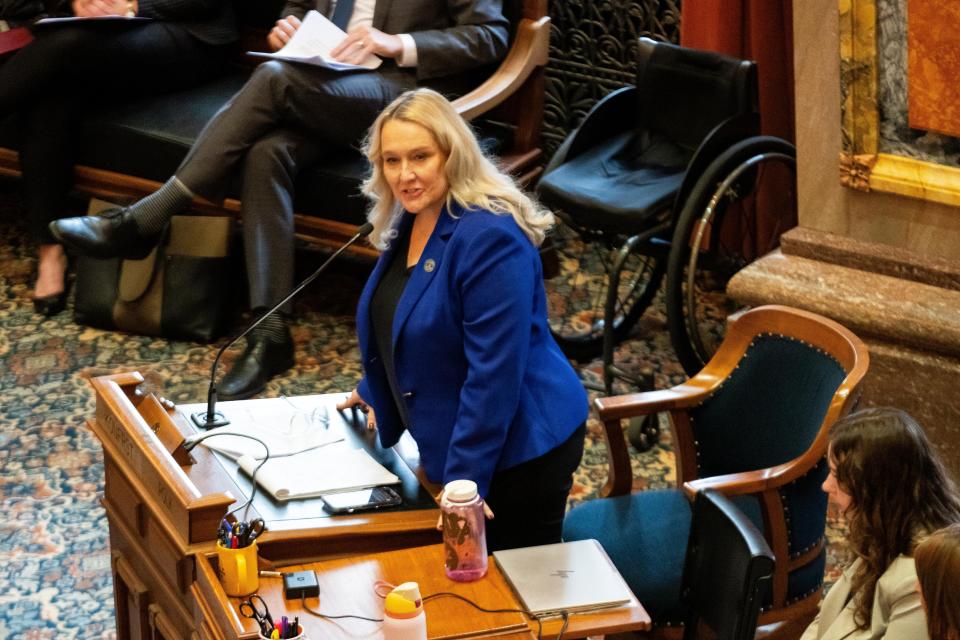Iowa House passes 'religious freedom' bill. Democrats say it allows discrimination
- Oops!Something went wrong.Please try again later.
Iowa lawmakers have passed a "religious freedom restoration act" that Republicans say will protect Iowans' constitutional right to practice their religion and Democrats say will allow discrimination against LGBTQ Iowans and others.
The House voted 61-33 to pass Senate File 2095 on Thursday evening, sending the measure to Gov. Kim Reynolds' desk for her signature.
Republicans have tried for years to pass similar religious freedom bills since taking control of the House, Senate and governor's office in 2016, but this year is the first time such a measure has reached the governor's desk.
"It gives people of faith a fair day in court," said the bill's floor manager, Rep. Steven Holt, R-Denison. "And unless you want a rigged system that disfavors religious liberty … there should be no reason not to support the religious freedom restoration act."

Democrats said the bill would allow people to cite their religious beliefs to deny service to LGBTQ Iowans and others.
"In my opinion, this bill is an example of extremism because it weaponizes religious beliefs to justify discrimination," said Rep. Heather Matson, D-Ankeny.
More: Iowa Senate passes 'religious freedom' bill that Democrats call 'blank check to discriminate'
In a statement released after the bill's passage, Reynolds indicated she intends to sign it into law.
"The right of religious freedom is endowed upon us by our creator — not government," she said in the statement. "Our founders recognized this principle, and today the Iowa House took a step forward to protect it. Twenty-three states around the country, with both Republican and Democrat governors, have passed similar laws. Now, it’s Iowa’s turn."
What would Iowa's religious freedom restoration act do?
The legislation would say that state and local governments shall not "substantially burden" someone's exercise of religion unless it is in furtherance of a compelling government interest and the least restrictive means of pursuing that interest.
A person, corporation, church, foundation or other entity whose exercise of religion has been burdened would have the power to go to court to seek damages or other means of redressing the harm against them.
The bill defines exercise of religion as action "substantially motivated by one's sincerely held religious belief, whether or not the exercise is compulsory or central to a larger system of religious belief."
"The religious freedom restoration act works because it is the right balancing test, that compelling government interest test, for courts to use to protect the precious right to religious freedom and balance it with other serious governmental interests," Holt said.
The federal government passed a "Religious Freedom Restoration Act" in 1993, and about two dozen states have their own version.
Democrats, businesses say the bill would hurt Iowa's ability to recruit workers
Business groups have opposed similar bills in Iowa for years, and several business groups and chambers of commerce urged lawmakers not to pass this year's bill. Lobbyists registered against the bill include the Krause Group, the Technology Association of Iowa, Principal Financial Group and the Iowa Chamber Alliance.
More: Iowa lawmakers advance 'religious freedom' bills over concern from businesses, LGBTQ groups
House Minority Leader Jennifer Konfrst, D-Windsor Heights, told reporters Thursday that the legislation would have a negative impact on Iowa's ability to recruit young workers in the state, even if the impact isn't evident right away.
"Legalizing discrimination is going to make it harder to recruit young people and keep young people to stay," she said. "We might not see an immediate economic impact, but we’re going to be able to look back in five years and see that all of the nonsense we’ve passed has made it harder to keep young people here."

She said she's heard stories about workers turning down jobs in Iowa because of the state's political climate.
"I have a recruiter in my district who calls me every time they try to recruit someone from out of state and that person laughs at them," Konfrst said. "This person calls me more than once a month because of Iowa’s reputation."
Democrats raised several examples of people in other states who have been denied medical services, including abortion, as well as examples of businesses denying services to LGBTQ Iowans.
In one high-profile case, the U.S. Supreme Court ruled in 2014 that Hobby Lobby could cite a religious belief under the federal law to refuse to cover birth control for its employees' health insurance plans.
"I wish these were hypothetical cases, but these are just the tip of the iceberg of the real cases that are happening throughout this country because states have this discriminatory law on the books," said Rep. Megan Srinivas, D-Des Moines.
Holt pushed back against those examples, arguing that many of them were decided on separate legal issues rather than religious freedom restoration laws and calling them "far-fetched scenarios."
"Bless your heart," Holt said, addressing Democrats. "Because so much of what was said on the floor tonight was not factual."
Galen Bacharier contributed reporting.
Stephen Gruber-Miller covers the Iowa Statehouse and politics for the Register. He can be reached by email at sgrubermil@registermedia.com or by phone at 515-284-8169. Follow him on Twitter at @sgrubermiller.
This article originally appeared on Des Moines Register: Iowa House passes 'religious freedom restoration act'

